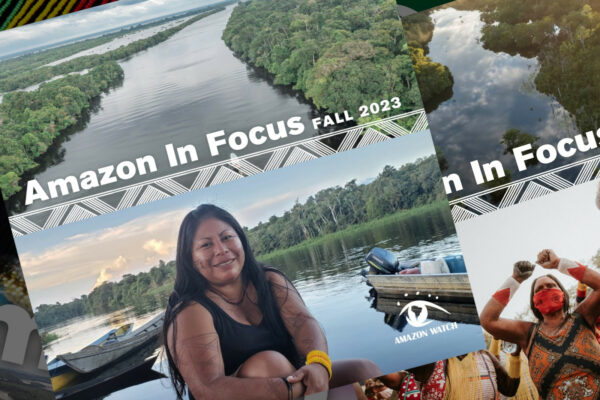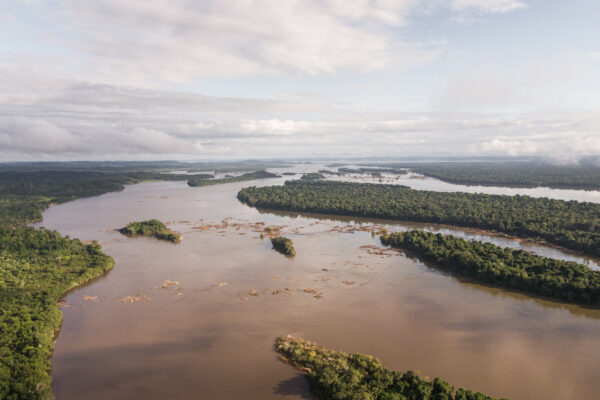The Bush administration is preparing this week to vote on financial support for a controversial $1.6 billion natural gas project in Peru that some U.S. officials, members of Congress and worldwide environmental groups say has already begun damaging a pristine tropical rain forest in the Amazon. Traditionally, such votes are set only when approval is assured.
The Camisea natural gas project involves two Texas energy companies with close ties to the White House – Hunt Oil Co. and Halliburton Co.’s Kellogg Brown & Root unit. In recent weeks, the administration has signaled that it supports the project, despite criticism from U.S. government officials concerned about harm to the rain forest and the Paracas National Reserve, Peru’s only marine sanctuary for endangered birds and mammals.
Some U.S. government officials internally are urging measures to mitigate environmental damage – including the relocation of an export terminal away from the marine preserve – that would entail delays opposed by project
sponsors and the Peruvian government, according to reports obtained by The Washington Post.
The boards of the Inter-American Development Bank and the Export-Import Bank of the United States are considering more than $300 million in financing for the project, which would pave the way for further low-interest funding from other public and private lenders. The IDB is set to vote on
Wednesday, and Ex-Im will take the issue up in the next couple of weeks.
Export-Import Bank President Phillip Merrill, a close ally of Vice President Cheney’s, declined to comment. The Treasury official who will cast the U.S. vote at the multilateral IDB is Bush appointee Jose A. Fourquet, who mobilized Hispanic support for President Bush’s 2000 campaign and also was a Bush fundraising “Pioneer.” Fourquet did not return phone calls. “We’re in the process of making the decision,” Treasury spokesman Tony Fratto said.
House Minority Leader Nancy Pelosi (D-Calif.), author of the 14-year-old law that requires environmental reviews of multilateral development bank loans, this month asked Treasury Secretary John W. Snow for a delay of the IDB vote to allow for more complete reviews. Last Tuesday, the U.S. Agency for International Development recommended to Treasury that the Pelosi amendment requires the United States to vote no on the project because the reviews were deficient.
Sen. Patrick J. Leahy (Vt.), ranking Democrat on the Senate Appropriations Committee panel that funds IDB and the Export-Import Bank, said this week that the project has “serious flaws.” He also called for no public financing
and a halt on further construction until damage is mitigated and “steps have been taken to prevent further harm.”
Robert H. Montgomery, IDB’s private lending environmental chief, defended the project and said problems will be corrected with requirements the bank attaches to the loan. “We believe that the impacts can be mitigated,”
Montgomery said. He said IDB has made “several extremely strong recommendations. We will not close the deal unless certain impacts are fully mitigated.”
Hunt Oil chairman Ray Hunt is among Bush’s premier fundraisers. The company has a major stake in the project with lead partner Pluspetrol of Argentina. Hunt and his wife recently each gave the maximum personal contribution of $2,000 to Bush’s reelection campaign. Hunt was a Bush Pioneer, an elite donor who raised at least $100,000 for the 2000 campaign. A Hunt spokesman declined to comment on the Camisea project.
Halliburton’s KBR unit is a top candidate to build a $1 billion seaside liquefied-natural-gas plant on the Peruvian coast if Hunt goes ahead with plans to export Camisea gas to the United States by 2006. Cheney was chief
executive of Halliburton before he stepped down to run for vice president. A Halliburton spokeswoman said the company has not been involved in lobbying for the project in Washington.
Targeting a gas field with 13 trillion cubic feet of gas, the companies have sunk wells amid the forest and cleared land for a gas-and-liquid processing plant. Two pipelines, 700 and 335 miles long, are 60 percent complete, trekking across the Andes on a route that will fork toward Lima
and the Paracas National Reserve.
The separation plant and pipelines slice through a forest renowned as one of the most biologically diverse places on the planet. Its inaccessibility has kept it largely untrammeled, except for an indigenous population of a
few thousand. Near the coast, another processing plant is planned for the buffer zone around the Paracas reserve, home to such rare species as Humboldt penguins and green sea turtles.
A 161-page assessment completed in May by Ex-Im stated that the location of the Paracas plant was selected for economic reasons – it allowed a savings of $50 million to $100 million – and not for environmental impact. An
underwater pipeline spill could kill fish, mammals and birds in the reserve, the assessment concluded, adding that the project is “ill-prepared for a spill of any magnitude.”
The analysis also found “massive areas of erosion” along the pipeline right-of-way. Project sponsors failed to examine the “secondary impacts,” the study notes.
“Access will lead to continued loss of forest cover, wildlife habitat loss, fragmentation, reduced forest biodiversity and reductions in populations of important plant and animal species over large areas,” the Ex-Im report said.
“Such effects are negative, significant, long term and largely irreversible without effective mitigation through project operation and after closure.”
The erosion also has left the pipeline unstable and muddied streams used for drinking. Moreover, routes cleared for the pipeline have provided a pathway for colonists, poachers, itinerant farmers and others that could wipe out large sections of the rain forest, the report states.
Last spring, the Treasury’s office charged with reviewing public bank loans drafted a report on Camisea warning that the project risks “sending a signal that project sponsors can bring poorly designed projects to [multilateral
development banks] too late in the process” to allow for changes.













